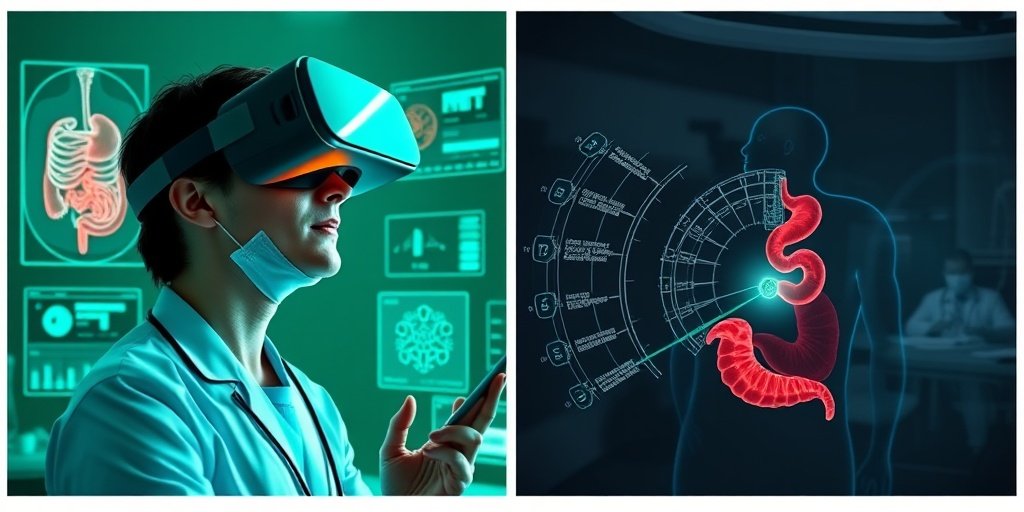⚡ Quick Summary
This article explores the transformative role of artificial intelligence (AI) in gastroenterology training over the past two decades, highlighting its applications in simulation-based learning, diagnostic support, and procedural skill acquisition. The findings indicate that AI technologies significantly enhance learning efficiency and improve patient outcomes.
🔍 Key Details
- 📊 Study Period: 2005-2025
- 🔍 Focus: AI applications in gastroenterology training
- 📚 Methodology: Comprehensive literature review following PRISMA guidelines
- 📈 Selected Studies: 22 studies from an initial 312 records
🔑 Key Takeaways
- 🤖 AI-driven tools enhance simulation-based learning in gastroenterology.
- 🏆 Virtual reality (VR) and augmented reality (AR) are pivotal in procedural training.
- 📈 AI systems like computer-aided detection (CADe) improve lesion detection rates.
- 💡 AI technologies streamline the learning process for trainees.
- 🌍 Global standardization of AI training tools is essential for equitable access.
- 🔍 Future research should focus on multi-centre trials and longitudinal evaluations.
- 🩺 Improved diagnostic capabilities lead to better patient outcomes.

📚 Background
The field of gastroenterology has seen remarkable advancements in training methodologies, particularly with the integration of artificial intelligence. As healthcare continues to evolve, the need for effective training tools that enhance the learning experience for gastroenterology trainees has become increasingly important. AI technologies offer innovative solutions that not only improve knowledge acquisition but also bolster clinical skills.
🗒️ Study
This study conducted a thorough review of literature published between 2005 and 2025, focusing on the role of AI in gastroenterology training. Utilizing databases such as PubMed, ScienceDirect, and the Cochrane Library, the researchers identified 22 relevant studies that provided insights into the effectiveness of AI-enhanced training tools, including simulation-based learning environments.
📈 Results
The review revealed that AI-enhanced simulation tools, particularly those utilizing VR and AR, significantly improved procedural training by providing immersive, risk-free environments for practice. Additionally, AI systems like CADe were shown to enhance diagnostic accuracy, leading to improved clinical decision-making and patient outcomes.
🌍 Impact and Implications
The integration of AI in gastroenterology training has the potential to revolutionize the educational landscape. By improving diagnostic capabilities and streamlining the learning process, AI technologies can significantly enhance the quality of care provided to patients. However, it is crucial to ensure that these advancements are accessible to trainees across diverse clinical settings through global standardization and equitable access.
🔮 Conclusion
The findings of this study underscore the transformative potential of AI in gastroenterology training. As we move forward, continued research and development in this area will be vital to fully realize the benefits of AI technologies in enhancing educational outcomes and improving patient care. The future of gastroenterology training looks promising with the ongoing integration of AI.
💬 Your comments
What are your thoughts on the integration of AI in gastroenterology training? We would love to hear your insights! 💬 Leave your comments below or connect with us on social media:
Role of Artificial Intelligence in Gastroenterology Training (2005-2025): Trends, Tools, and Challenges.
Abstract
Over the past two decades, gastroenterology training (GI training) has undergone a significant transformation through the integration of advanced technologies, particularly artificial intelligence (AI). The emergence of AI as a transformative tool has facilitated notable changes in how GI trainees acquire knowledge and skills. Key applications of AI in this context include simulation-based learning, diagnostic decision support, and procedural skill acquisition. These AI-driven innovations are increasingly recognised for enhancing learning efficiency, improving diagnostic accuracy, and building procedural confidence among trainees. To explore the extent of AI’s impact on GI education, a comprehensive literature review was conducted. The search followed PRISMA guidelines and focused on peer-reviewed articles published between 2005 and 2025. Databases such as PubMed/NCBI, ScienceDirect, and the Cochrane Library were used, along with targeted searches in leading GI journals. The initial search yielded 312 records. After applying the inclusion and exclusion criteria, 22 studies were selected for final synthesis. These included randomised controlled trials, observational studies, systematic reviews, and narrative analyses. The reviewed studies consistently demonstrated that AI-enhanced simulation tools, particularly those incorporating virtual reality (VR) and augmented reality (AR), played a pivotal role in procedural training. These tools offered immersive, risk-free environments that allowed trainees to practice and refine their technical skills before applying them in real-world clinical scenarios. AI also proved valuable in diagnostic decision support. Systems such as computer-aided detection (CADe) were shown to significantly increase lesion detection rates during endoscopic procedures, contributing to improved clinical decision-making and better patient outcomes. Additionally, AI-assisted technologies enhanced procedural training by supporting more precise biopsy targeting and facilitating lesion identification during endoscopic ultrasound (EUS). As per our review, the evidence suggests that AI technologies are making meaningful contributions to GI training by improving diagnostic capabilities, streamlining the learning process, and supporting technical skill acquisition. However, despite these promising developments, further research is necessary. Future studies should include multi-centre randomised controlled trials and longitudinal evaluations to establish long-term efficacy. Furthermore, efforts toward global standardisation of AI training tools and equitable access are essential to ensure that these technologies benefit trainees across diverse clinical settings.
Author: [‘Farooq F’, ‘Warraich MUT’, ‘Ud Din MM’, ‘Saleem N’, ‘Asif MS’, ‘Khan H’]
Journal: Cureus
Citation: Farooq F, et al. Role of Artificial Intelligence in Gastroenterology Training (2005-2025): Trends, Tools, and Challenges. Role of Artificial Intelligence in Gastroenterology Training (2005-2025): Trends, Tools, and Challenges. 2025; 17:e90085. doi: 10.7759/cureus.90085